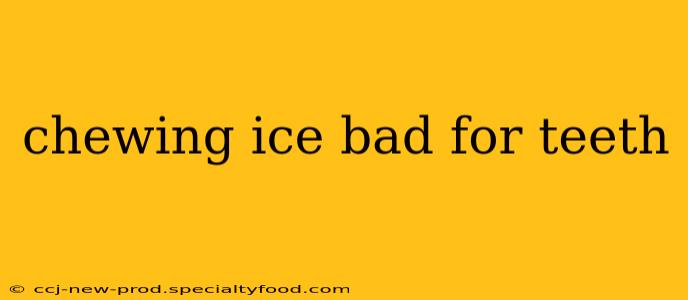Chewing ice seems harmless, a refreshing way to cool down on a hot day. However, the seemingly innocent habit can actually have detrimental effects on your dental health. This comprehensive guide explores the potential damage chewing ice can inflict on your teeth and offers advice on how to break the habit.
Why is Chewing Ice Bad for Your Teeth?
The primary reason chewing ice is detrimental to your teeth is its hardness. Ice is significantly harder than your tooth enamel, the protective outer layer. When you bite down on ice, you're essentially subjecting your enamel to considerable force and abrasion. This can lead to several problems:
-
Cracked or Chipped Teeth: The most immediate consequence of chewing ice is the risk of cracking or chipping your teeth. The force exerted can cause fractures, even in seemingly healthy teeth. These cracks can be microscopic at first, making them difficult to detect, but they can eventually lead to more serious problems.
-
Worn Enamel: Repeatedly chewing ice wears down your enamel over time. This process is known as abrasion. Thinner enamel leaves your teeth more vulnerable to cavities, sensitivity, and discoloration.
-
Increased Tooth Sensitivity: As your enamel wears away, the dentin (the layer beneath the enamel) becomes exposed. Dentin contains microscopic tubules that lead to the tooth's nerve, making your teeth more sensitive to hot, cold, sweet, or acidic foods and drinks.
-
Broken Fillings or Crowns: If you have existing dental work like fillings or crowns, the stress from chewing ice can cause them to crack or break, requiring further dental intervention.
How Can I Tell if Chewing Ice Has Damaged My Teeth?
Recognizing the signs of ice-induced dental damage is crucial for timely intervention. Be vigilant for:
- Sharp Pain When Biting Down: This is a classic sign of a cracked tooth.
- Increased Tooth Sensitivity: Noticeable sensitivity to temperature changes or certain foods and drinks.
- Visible Cracks or Chips: Inspect your teeth regularly in a mirror for any visible damage.
- Discoloration: Noticeable darkening or staining of your teeth could indicate enamel wear.
If you experience any of these symptoms, schedule an appointment with your dentist immediately.
What Happens If I Continue Chewing Ice?
Ignoring the detrimental effects of chewing ice can lead to more serious dental problems. Persistent chewing can result in:
- More Extensive Tooth Damage: Small cracks can propagate, leading to larger fractures and potentially the need for root canals or even tooth extractions.
- Increased Risk of Cavities: Worn enamel leaves your teeth more susceptible to bacterial attack and the development of cavities.
- Costly Dental Repairs: Treating cracked teeth, worn enamel, or broken fillings is often expensive.
The cumulative damage from years of chewing ice can be significant, both aesthetically and functionally.
How Can I Stop Chewing Ice?
Breaking the habit of chewing ice can be challenging, but it’s essential for protecting your dental health. Try these strategies:
- Identify Triggers: Understand why you chew ice. Is it habit, boredom, or a way to cope with stress?
- Find Alternatives: Keep a bottle of water or other refreshing beverages on hand.
- Gradual Reduction: Don't try to quit cold turkey. Gradually decrease your ice consumption.
- Mindfulness: Pay attention to when you reach for ice. Consciously choose an alternative.
- Seek Support: Talk to your dentist or a therapist if you need help breaking the habit.
Is Chewing Ice Worse Than Other Hard Foods?
While other hard foods like nuts and hard candies can also cause wear and tear on teeth, ice poses a unique risk due to its extremely low temperature and crystalline structure. This makes it exceptionally hard and brittle, potentially causing more severe damage compared to most other foods.
Can I Chew Sugar-Free Ice?
The type of ice (sugar-free or not) doesn't change the risk of enamel damage. The hardness of the ice, not the presence of sugar, is the culprit.
In conclusion, while chewing ice might seem harmless, the potential for serious dental damage is undeniable. Recognizing the risks and actively working to break the habit are crucial steps toward preserving your oral health. Regular dental checkups are also essential for early detection and treatment of any issues. Remember, protecting your smile is worth the effort!
